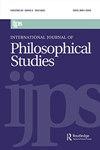亲密关系中的共同内疚
IF 0.6
3区 哲学
0 PHILOSOPHY
INTERNATIONAL JOURNAL OF PHILOSOPHICAL STUDIES
Pub Date : 2022-05-27
DOI:10.1080/09672559.2022.2121897
引用次数: 0
摘要
摘要本文试图证明一个常见但在哲学上令人困惑的现象:有时,一个人会对自己所爱的人犯下的错误感到极度内疚,尽管他们没有过错。在这些情况下,有罪违背了我们道德生活中的一个基本原则,即过错原则。根据这一原则,只有当一个人在错误方面有过错时,他才应该为错误承担责任。只要这里探讨的家庭成员没有过错,他们声称的内疚经历似乎是不合理的。针对非理性的指控,我认为,有时在道德上是恰当的,甚至在道德上也是必要的,因为自己对所爱的人的错误没有任何责任。此外,就第一次个人经历应该决定受害者和第三方的责任评估而言,我的结论是,这些其他人也有理由认为亲密关系是应受谴责的。最后,我将无过错的内疚现象扩展到亲密环境之外,扩展到白人的内疚体验。本文章由计算机程序翻译,如有差异,请以英文原文为准。
Shared Guilt among Intimates
ABSTRACT This paper seeks to vindicate a common but philosophically puzzling phenomenon: Sometimes, a person experiences extreme guilt in relation to a wrong that their loved one has committed, even though they are not at fault for that wrong. Guilt in these cases violates a foundational principle in our moral lives – viz., the fault principle. On that principle, one is blameworthy for a wrong only if one is at fault with respect to that wrong. Insofar as the family members explored here are not at fault, their professed experience of guilt looks to be irrational. Against the charge of irrationality, I argue that it is sometimes morally appropriate, and perhaps even morally required, to judge oneself to be blameworthy for the wrong of a loved one in which one played no culpable part. Further, insofar as the first-personal experience ought to dictate the responsibility assessments of victims and third parties, I conclude that these other individuals will have reason to take the intimate to be blameworthy too. I end by extending the phenomenon of faultless guilt beyond the intimate context, to the experience of white guilt.
求助全文
通过发布文献求助,成功后即可免费获取论文全文。
去求助
来源期刊

INTERNATIONAL JOURNAL OF PHILOSOPHICAL STUDIES
PHILOSOPHY-
CiteScore
0.90
自引率
0.00%
发文量
29
期刊介绍:
The International Journal of Philosophical Studies (IJPS) publishes academic articles of the highest quality from both analytic and continental traditions and provides a forum for publishing on a broader range of issues than is currently available in philosophical journals. IJPS also publishes annual special issues devoted to key thematic areas or to critical engagements with contemporary philosophers of note. Through its Discussion section, it provides a lively forum for exchange of ideas and encourages dialogue and mutual comprehension across all philosophical traditions. The journal also contains an extensive book review section, including occasional book symposia. It also provides Critical Notices which review major books or themes in depth.
 求助内容:
求助内容: 应助结果提醒方式:
应助结果提醒方式:


